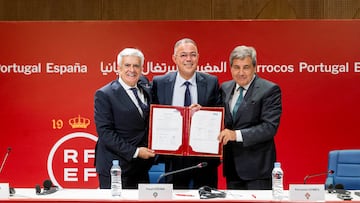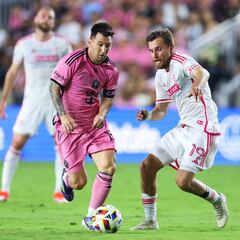Spain confirm 11 venues and 45 sub-venues for the 2030 World Cup
Morocco and Portugal refused to expand the Spanish quota despite the intervention of the government and diplomatic and political negotiations between the representatives of the three countries.

Spain’s Football Federation (RFEF) has completed the dossier that it will send to FIFA confirming the 11 Spanish venues for the 2030 World Cup. As this newspaper exclusively anticipated, Vigo and Valencia have been left out. The government explored diplomatic routes with Morocco and Portugal during the last two weeks, but without success.
What are the 11 Spanish stadiums selected for the 2030 World Cup?
The two bidding partners are not prepared to give up their allocations (six venues for the North Africans and three for the Portuguese), taking advantage of the FIFA rule that imposes a maximum of 20 host cities.
2030 World Cup venues in Spain
Reale Arena (Donostia-San Sebastián)
Spotify Camp Nou (Barcelona)
Gran Canaria (Las Palmas)
La Cartuja (Seville)
La Rosaleda (Málaga)
Metropolitano (Madrid)
Nueva Romareda (Zaragoza)
RCDE Stadium (Barcelona, Cornellá-El Prat)
Riazor (A Coruña)
San Mamés (Bilbao)
Santiago Bernabéu (Madrid)
The RFEF propose that the 2030 World Cup final should be held at the Santiago Bernabéu in Madrid on Sunday 21 July 2030, in line with FIFA’s own plans.
FIFA will confirm all of the host venues for the tournament during their General Assembly on 11 December 2024.
Valencia and Vigo omitted
Valencia (Mestalla) was left out because Peter Lim demanded an urban reclassification and Vigo, despite political interests, due to the uncertain remodeling of Balaídos stadium.
Apart from the main venues, other facilities and training grounds - or sub-venues, will be distributed throughout Spain to accommodate the 2030 World Cup. Specifically, up to 16 autonomous communities and a total of 45 Spanish cities will see facilities from their territories proposed as sub-venues within the RFEF’s dossier.
Andalusia, Canary Islands, Cantabria, Castilla y León, Castilla-La Mancha, Catalonia, Community of Madrid, Valencia, Extremadura, Galicia, Balearic Islands, La Rioja, Navarra, Basque Country, Asturias and Murcia have representatives on this list. The final decision on the use of these sub-venues, which must now go through a direct evaluation process by FIFA, will correspond to the teams participating in the 2030 World Cup. The facilities and cities chosen are the following:
- José Luis Compañón Sports City - Ibaia (Vitoria-Gasteiz, Álava)
- Andrés Iniesta Sports City - Albacete Balompié (Albacete)
- Camilo Cano Sports City (La Nucía, Alicante)
- New Sports City of Elche (Elche, Alicante)
- Villaitana Football Center (Benidorm, Alicante)
- Power Horse Stadium + Annex (Almería)
- Francisco de la Hera Stadium + Sports City (Almendralejo, Badajoz)
- Old Vivero Sports City + Nuevo Vivero Stadium (Badajoz)
- Barceló Montecastillo Golf & Sports Resort (Jérez de la Frontera, Cádiz)
- Barceló Costa Ballena Golf & Spa (Rota, Cádiz)
- Fairplay Golf & Spa Resort (Benalu-Casas Viejas, Cádiz
- Javier Pérez Sports City - CD Tenerife (Tenerife, Canary Islands)
- Nando Yosu 1 and 2 facilities (Santander, Cantabria)
- Jose Manuel Llaneza Sports City (Villarreal, Castellón)
- Rafael Gómez Sports City (Córdoba)
- New Girona FC Sports City (Girona)
- Torremirona Relais Hotel Golf & Spa (Navata, Girona)
- Camiral Golf & Wellness - Vinya Football School (Girona)
- Granada CF Sports City (Granada)
- New Eibar Sports City (Eibar, Guipúzcoa)
- Palladium Can Misses Stadium + Annex (Ibiza, Balearic Islands)
- Antonio Asensio Sports City - RCD Mallorca (Palma de Mallorca)
- UD Logroñés Sports City (Logroño, La Rioja)
- El Toralín Municipal Stadium + Annex (Ponferrada, León)
- Fernando Santos de la Parra Sports City (Getafe, Community of Madrid)
- Rayo Vallecano Foundation Sports City (Madrid)
- Butarque C.D. Sports Facility Leganés (Leganés, Community of Madrid)
- Real Madrid Sports City (Madrid)
- Estepona Football Center (Estepona, Malaga)
- Marbella Football Center (Marbella, Malaga)
- Jose Fouto Roman Stadium + Diocles Field (Mérida)
- Tajonar Facilities - CA Osasuna (Tajonar, Navarra)
- Afouteza Sports City (Vigo, Pontevedra)
- A Madroa Sports City (Vigo, Pontevedra)
- Mareo Football School (Gijón, Principality of Asturias)
- Grand Hyatt La Manga Club Resort (La Manga, Region of Murcia)
- Pinatar Arena Football Center (San Pedro del Pinatar, Region of Murcia)
- DoubleTree by Hilton La Torre Golf & Spa Resort (Roldán, Region of Murcia)
- Alhama Arena Football Center (Alhama de Murcia, Region of Murcia)
- Football Salou Sports Center (Salou, Tarragona)
- New Costa Daurada Stadium + Annex (Tarragona)
- Oliva Nova Sports Center (Oliva, Valencia, Valencian Community)
- Paterna Facilities - Valencia CF (Paterna, Valencia)
- Levante UD Sports City (Buñol, Valencia)
- Real Valladolid Sports City (Valladolid)
The FIFA Council approved the joint candidacy of Morocco, Portugal and Spain in a single candidate bidding process with 101 matches to be played during the duration of the tournament.
Related stories
The FIFA Council also unanimously agreed to host a unique centenary celebration ceremony in Uruguay’s capital, Montevideo, where the first-ever FIFA World Cup took place in 1930, as well as three World Cup matches in Uruguay, Argentina and Paraguay.
The centenary celebration ceremony and first matches will be played on Saturday-Sunday 8-9 June 2030 with the official opening ceremony and opening games set for Thursday-Friday 13-14 June 2030.


Complete your personal details to comment